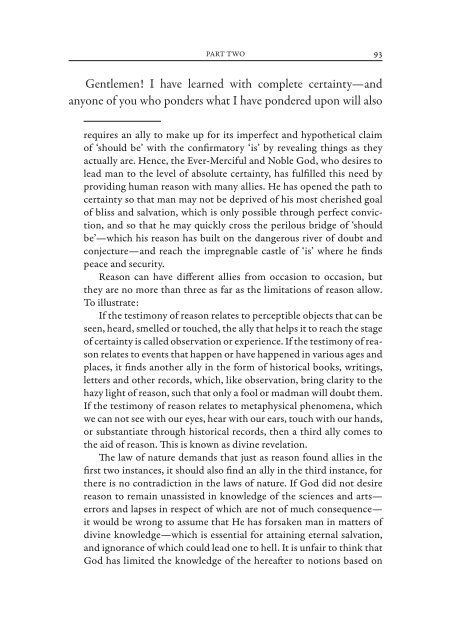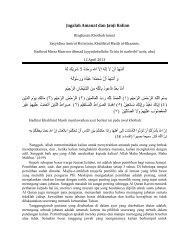Create successful ePaper yourself
Turn your PDF publications into a flip-book with our unique Google optimized e-Paper software.
Part two<br />
Gentlemen! I have learned with complete certainty—and<br />
anyone of you who ponders what I have pondered upon will also<br />
requires an ally to make up for its imperfect and hypothetical claim<br />
of ‘should be’ with the confirmatory ‘is’ by revealing things as they<br />
actually are. hence, the Ever-Merciful and Noble God, who desires to<br />
lead man to the level of absolute certainty, has fulfilled this need by<br />
providing human reason with many allies. he has opened the path to<br />
certainty so that man may not be deprived of his most cherished goal<br />
of bliss and salvation, which is only possible through perfect conviction,<br />
and so that he may quickly cross the perilous bridge of ‘should<br />
be’—which his reason has built on the dangerous river of doubt and<br />
conjecture—and reach the impregnable castle of ‘is’ where he finds<br />
peace and security.<br />
reason can have different allies from occasion to occasion, but<br />
they are no more than three as far as the limitations of reason allow.<br />
To illustrate:<br />
If the testimony of reason relates to perceptible objects that can be<br />
seen, heard, smelled or touched, the ally that helps it to reach the stage<br />
of certainty is called observation or experience. If the testimony of reason<br />
relates to events that happen or have happened in various ages and<br />
places, it finds another ally in the form of historical books, writings,<br />
letters and other records, which, like observation, bring clarity to the<br />
hazy light of reason, such that only a fool or madman will doubt them.<br />
If the testimony of reason relates to metaphysical phenomena, which<br />
we can not see with our eyes, hear with our ears, touch with our hands,<br />
or substantiate through historical records, then a third ally comes to<br />
the aid of reason. This is known as divine revelation.<br />
The law of nature demands that just as reason found allies in the<br />
first two instances, it should also find an ally in the third instance, for<br />
there is no contradiction in the laws of nature. If God did not desire<br />
reason to remain unassisted in knowledge of the sciences and arts—<br />
errors and lapses in respect of which are not of much consequence—<br />
it would be wrong to assume that he has forsaken man in matters of<br />
divine knowledge—which is essential for attaining eternal salvation,<br />
and ignorance of which could lead one to hell. It is unfair to think that<br />
God has limited the knowledge of the hereafter to notions based on<br />
93




